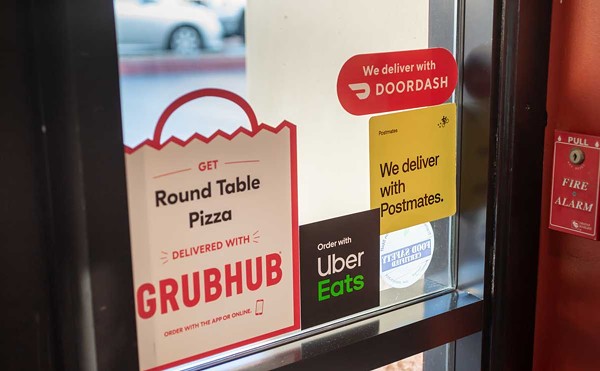Americans are dining out more than ever. For the first time since the Commerce Department started collecting data in 1992, U.S. residents spent more on dining and drinks than they did on groceries. And, in the ideal world, this would mean we’re entering a new age where fine dining is truly for all, and we goad our chefs on to ever higher epicurean delights.
The reality, though, is more likely that overworked, time-starved Americans are foregoing cooking and hitting the drive-through on the way home. In fact, Americans seem more displeased than ever with dining. Here at Metro Times, we can attest to it. What’s more, when we look at reviews online, or listen to callers who ring us to complain, or sometimes try soothing the jangled nerves of restaurant owners defending their domains like bulldogs, we see a double-standard of sorts: People who’d never complain about a Big Mac or a Hot-n-Ready seem all too ready to rip into a restaurant over minor, even expected problems.
Maybe it’s time to have a little talk. Sure, some restaurants promise more than they deliver, but a bit of education and inquiry on the diner’s part can make quite a difference. Here’s a few items of advice, some very elementary, for today’s metro Detroiters who are about to walk right into the fairly overheated dining scene of right now.
• Don’t go when you’re starving: It’s important not to spoil your appetite, but going out to eat when you’re famished can be an unpleasant experience. Diners should feel that gentle stirring of anticipation after they order, but hunger doesn’t make the experience more enjoyable; it often means a raid on the bread basket, ordering twice as much as one can eat, and a big doggie bag later. If you’re feeling too hungry before going to dinner, you might consider having a light snack beforehand.
• Ask the prices for the specials: Few diners are as angry as the one who orders the special from the waiter only to realize later it’s twice the cost of anything else on the menu. The dishes are called “specials” for a reason, right? It probably shouldn’t be the case, but the onus is really on you to understand just how much it costs.
• Order with the crowd: If you go to a restaurant called Namor’s Amazing Seafood House and order a burger, do not be surprised if the dish is not to your liking. You are, after all, in a place with a signature cuisine, seafood. The burger may be good or bad, but the owners of the restaurant are staking their reputation on the seafood. That’s what you should try.
• Understand the seasons: Don’t get pissed off when you learn they’re out of stuff at a seasonal restaurant. You can’t really fault a seasonal restaurant for not having enough kale after a few weeks of an unseasonably hot spring, or for running short on Vidalia onions toward the end of summer. The whole point is to get the freshest food available, but you’d hardly guess it reading the angry reviews posted online.
• Call ahead with dietary questions: If you have dietary restrictions or want to know what vegetarian or vegan options are available, call ahead. It would be nice if every restaurant was prepared to furnish healthful meals to all guests, no matter what their requirements. But it can be expensive, demanding work that restaurants are under no obligation to do, and, in some ways, it’s unfair to them to simply expect all restaurants to be able to accommodate dietary restrictions. Instead of getting all the way there only to be disappointed, find out if the eatery isn’t for you before you ever arrive.
• Call, call, call: Don’t just check the website to see what’s on the menu; call. The online menu may be outdated, and in the hectic crush of daily work to be done, a website may be neglected or altogether forgotten. Ask about any special policies, such as dress codes or bans on excessive smart phone use. The last thing you want is to get all the way there and be denied service or shown the door.
• Know the truth about soft openings: When you attend a soft opening, be supple. You’re agreeing to be a kind of guinea pig so the restaurant can learn where the speed bumps are. They want to hear what didn’t work for you, and you’re not helping anybody by simmering silently and then getting hot under the collar about it on Yelp later that night.
• If you make reservations, keep them: These days, people complain that fewer and fewer restaurants accept reservations. Those complaints seem grounded in reality, and it makes sense; restaurants that reserve tables have more tables empty longer, and in a business where profit margins are razor-thin, this can be fatal. So if you do make reservations, please do everybody else a favor and keep them. Reserving a seat in a restaurant should be like reserving a seat on a train; arrive a bit early, and, if you’re late, don’t be surprised to see the train has pulled out of the station already.
• Avoid the rush: One reason restaurants have waits is because everybody is running on the same schedule. Unless you absolutely have to have dinner with your date, call ahead and find out when the rush starts. Of course, some places only serve the dinner menu when everybody wants it, and there is one way to have dinner and also have the room practically to yourself: Go on Super Bowl Sunday night.
• Learn how not all waiting lists are the same: When a restaurant that doesn’t take reservations is really hot, wait times can soar to an hour or more. But you don’t have to suffer silently. Did you know that a lot of the restaurants that have the longest wait times have amenities to help? At Slows Bar-B-Q and Vinsetta Garage, two restaurants with notable waits, they have pagers to pass out to those on the waiting list. There’s no reason anymore to be crammed in at Slows while you wait for a low-top for four; you could be doing shots at LJ’s.
• Be prepared to wait: All that said, though, there are times in the lives of adults when waiting for an hour is unavoidable. Do what it takes to make it through the wait gracefully. It’s a strange quirk of psychology that people will bring a good book or a gamepad to the Secretary of State’s office but would rather grumble angrily while waiting for a table for two.
• Reserve a 'Plan B': Sometimes, things just go wrong. Fights break out, misunderstandings erupt, credit cards or cash get lost, parking is impossible. The strange thing is that the more obstacles people encounter, the more determined they often become to have a good time. (There’s a reason in Chicago it’s against the law to eat in an establishment that is on fire.) Instead of fighting against all odds to save a night, why not just have a bailout plan? If everything goes wrong, you’ve already decided to go to your neighborhood bar, even if you’re wearing gowns and tuxes. We did it once and it defused what could have been a particularly nasty night.
• Reward a restaurant with good word-of-mouth: Finally, if you do have a fabulous time and the restaurant really comes through for you, don’t just go online: Tell all your friends what a wonderful time you had. Believe it or not, this is how we used to spread the word about a wonderful place in town, back before it became a status symbol to review a place early and often for an online “service.” Your friends will thank you, and the restaurant will thrive, thanks to the perfectly tuned set of customers you sent along.





